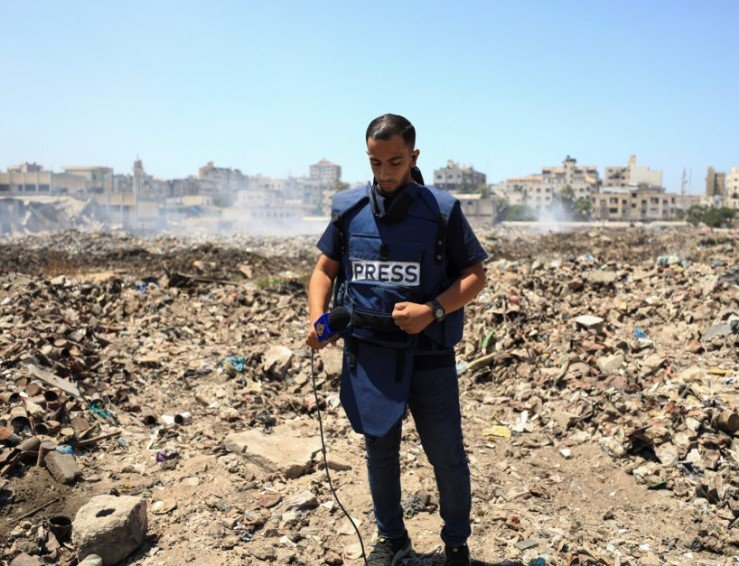Israel has confirmed an airstrike in Gaza that killed five journalists working for Al Jazeera, including Anas al-Sharif, one of the network’s most prominent correspondents, who had become a vital source of on-the-ground reporting during the war.
The strike, carried out late Sunday, also killed two bystanders, according to the Qatari-owned news channel. Al Jazeera described the attack as a “deliberate attempt to silence voices exposing the realities of Gaza,” while Israeli officials claimed the journalists were active members of a Hamas military unit.
A Final Dispatch from the Field
Hours before his death, al-Sharif posted a video to social media showing what he described as the “relentless bombardment” of Gaza. His last written message on X read:
“I have lived through pain in all its details, tasted suffering and loss many times, yet I never once hesitated to convey the truth as it is, without distortion or falsification — so that Allah may bear witness against those who stayed silent, those who accepted our killing.”
The 39-year-old had covered multiple wars in Gaza for Al Jazeera, building a reputation for staying in some of the most dangerous zones long after other journalists had evacuated.
Conflicting Narratives
The Israel Defense Forces (IDF) alleged that al-Sharif was not just a journalist, but the head of a Hamas terrorist cell who had led “advanced rocket attacks” on Israeli territory. It offered no public evidence to support the claim.
Al Jazeera called the accusations “baseless smears” aimed at justifying the killing of its reporters. The network has faced repeated restrictions in Israel, where officials have accused it of acting as a propaganda arm for Hamas.

The United Nations special rapporteur for freedom of expression, Irene Khan, had warned in July that Israeli claims against al-Sharif were unsubstantiated and placed him in heightened danger. After the strike, she called for targeted sanctions against Israel, accusing it of violating international humanitarian law.
The Other Journalists Killed
Alongside al-Sharif, the airstrike killed fellow correspondent Mohammed Qreiqeh, cameramen Ibrahim Zaher and Moamen Aliwa, and their assistant Mohammed Noufal. Funerals for the journalists drew thousands of mourners on Monday, with colleagues carrying press-marked vests stained with dust and blood.
Local journalists say the tent where the group was sheltering was clearly marked as a media facility. Israel has not responded to questions about whether the site was on its no-strike list.
A Wider Pattern
According to Gaza’s media office, Israel has killed at least 238 journalists over the past 22 months of war. Press freedom organizations say that represents one of the highest journalist death tolls in a conflict in recent decades.
Israel disputes those numbers, arguing that many of those killed were combatants or “affiliated” with militant groups. But media advocacy groups say Israel has failed to provide credible evidence in most cases and has blurred the line between combatant and journalist in its public statements.
Information Blackout
Foreign correspondents have been barred from entering Gaza since the start of the current war, forcing news organizations to rely almost entirely on local reporters to document events. That has made journalists like al-Sharif essential — and vulnerable.
Sherif Mansour, Middle East coordinator for the Committee to Protect Journalists, said the killing of high-profile reporters like al-Sharif suggests “a deliberate strategy to intimidate or remove independent witnesses from the battlefield.”
Al Jazeera, one of the few international networks maintaining a significant presence in Gaza, says it has lost multiple staff members to Israeli strikes since October 2023.
Reactions Abroad
The Qatari government, which owns Al Jazeera, condemned the attack as a “heinous crime” and vowed to raise it at the United Nations Security Council. Doha has also served as a mediator in indirect talks between Israel and Hamas, making the strike a potential diplomatic flashpoint.
Human rights organizations, including Amnesty International and Human Rights Watch, have called for an independent investigation into the killings. The European Union’s foreign policy chief, Josep Borrell, said the deaths underscored the need for “unfettered access for international journalists” in conflict zones.
Inside Gaza, A Chilling Effect
For Gaza’s remaining press corps, the deaths have deepened a sense of exposure and isolation. “When they kill someone like Anas, who was known around the world, what do you think it means for the rest of us?” said Ibrahim Abu Moussa, a fellow Palestinian journalist who has also been covering the war from the front lines.
He added that the loss of veteran reporters makes it harder to document possible war crimes. “The occupation says that by killing us, they stop the story. But it only makes it more important to tell it.”
War Continues to Escalate
The airstrike came amid intensifying Israeli operations in Gaza, where the military has said it plans to escalate ground incursions and target what it describes as the “last remaining Hamas strongholds.” Palestinian health officials say thousands of civilians remain trapped in besieged areas with limited access to food, water, or medical care.
The killings also coincided with large-scale protests in Israel, where tens of thousands have rallied against Prime Minister Benjamin Netanyahu’s war policy, including families of hostages who say the government’s military-first approach is endangering their loved ones.
What Happens Next
It remains unclear whether the deaths of the five Al Jazeera journalists will lead to any international accountability. Israel has historically rejected external investigations into its military conduct, arguing that its own judicial system is capable of reviewing such incidents.
Al Jazeera says it will pursue legal action in international courts, while the United Nations is expected to raise the matter at an upcoming session of the Human Rights Council.
For many in Gaza, however, the impact is immediate: fewer journalists are left to tell the world what is happening inside the enclave. As Abu Moussa put it: “Every time we lose one of our own, the truth gets harder to find.”
